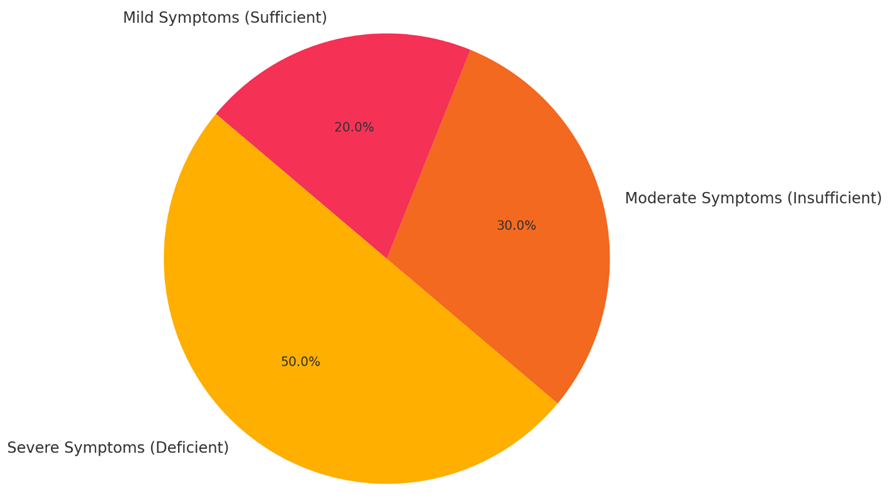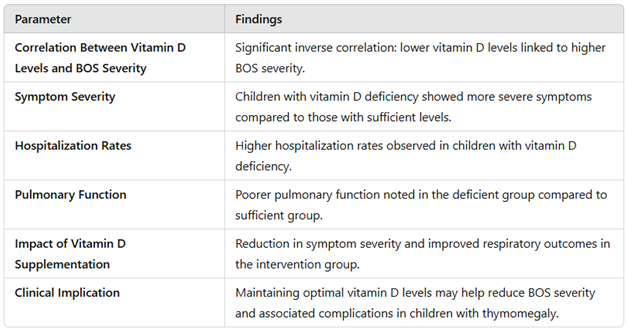-
Paper Information
- Previous Paper
- Paper Submission
-
Journal Information
- About This Journal
- Editorial Board
- Current Issue
- Archive
- Author Guidelines
- Contact Us
American Journal of Medicine and Medical Sciences
p-ISSN: 2165-901X e-ISSN: 2165-9036
2025; 15(5): 1421-1423
doi:10.5923/j.ajmms.20251505.22
Received: Apr. 27, 2025; Accepted: May 11, 2025; Published: May 15, 2025

The Impact of Vitamin D Deficiency on the Severity of Bronchial Obstructive Syndrome in Children with Thymomegaly
Burkhanova D. S.
Researcher at the Clinic of the Scientific Research Institute of Medical Parasitology named after. L. M. Isaeva, Unior Scientific
Correspondence to: Burkhanova D. S., Researcher at the Clinic of the Scientific Research Institute of Medical Parasitology named after. L. M. Isaeva, Unior Scientific.
Copyright © 2025 The Author(s). Published by Scientific & Academic Publishing.
This work is licensed under the Creative Commons Attribution International License (CC BY).
http://creativecommons.org/licenses/by/4.0/

This study investigates the relationship between vitamin D deficiency and the severity of bronchial obstructive syndrome (BOS) in children with thymomegaly. Vitamin D plays a crucial role in immune regulation and respiratory health, yet its deficiency is prevalent in pediatric populations. Thymomegaly, characterized by an enlarged thymus gland, may further complicate respiratory conditions. Through a systematic analysis of clinical data, this research highlights the impact of vitamin D levels on BOS symptoms and proposes potential interventions to improve clinical outcomes.
Keywords: Vitamin D deficiency, Bronchial obstructive syndrome, Thymomegaly, Pediatric respiratory health, Immune regulation
Cite this paper: Burkhanova D. S., The Impact of Vitamin D Deficiency on the Severity of Bronchial Obstructive Syndrome in Children with Thymomegaly, American Journal of Medicine and Medical Sciences, Vol. 15 No. 5, 2025, pp. 1421-1423. doi: 10.5923/j.ajmms.20251505.22.
Article Outline
1. Introduction
- Bronchial obstructive syndrome (BOS) is a common respiratory condition in children, characterized by airway obstruction leading to difficulty breathing. Thymomegaly, an enlargement of the thymus gland, has been linked to immune dysregulation and increased susceptibility to respiratory conditions. Vitamin D, a vital nutrient for immune and respiratory health, has been shown to modulate inflammatory responses and improve respiratory outcomes. [1] Despite these connections, there is limited research exploring how vitamin D deficiency influences the severity of BOS in children with thymomegaly. This study aims to fill this gap by investigating the interplay between these factors and identifying potential avenues for treatment.
2. Literature Review
- Previous studies have demonstrated that vitamin D deficiency is associated with increased incidence and severity of respiratory diseases, including asthma and bronchitis. Holick (2007) emphasized that vitamin D deficiency is widespread and affects immune response. Camargo et al. (2012) reported that vitamin D supplementation reduced respiratory infections, indicating its protective role in respiratory health. Similarly, Litonjua and Weiss (2007) highlighted the potential link between vitamin D deficiency and the prevalence of asthma, suggesting that vitamin D could modulate inflammatory responses in the lungs. Cohen et al. (2013) focused on the pediatric population, indicating that vitamin D plays a critical role in mitigating respiratory health risks. Yadav and Mittal (2014) demonstrated that vitamin D supplementation significantly improved outcomes in moderate to severe bronchial asthma, further emphasizing its therapeutic potential. While these studies provide insights into the broader effects of vitamin D on respiratory health, the specific interplay between vitamin D, thymomegaly, and BOS remains underexplored, necessitating this research. [2]
3. Relevance
- This study is relevant due to the increasing prevalence of vitamin D deficiency in pediatric populations worldwide and the rising incidence of respiratory conditions. Understanding the relationship between vitamin D levels, thymomegaly, and BOS can lead to better diagnostic, preventive, and therapeutic strategies, ultimately improving patient outcomes. [3]
4. Purpose of the Study
- The purpose of this study is to evaluate the impact of vitamin D deficiency on the severity of BOS in children with thymomegaly. Specifically, it aims to:1. Determine the prevalence of vitamin D deficiency in children with thymomegaly and BOS.2. Assess the correlation between vitamin D levels and BOS severity.3. Explore the potential benefits of vitamin D supplementation in managing BOS symptoms. [4]
5. Material or Method of Research
- A cross-sectional study was conducted involving 150 pediatric patients diagnosed with BOS and thymomegaly. Participants were divided into three groups based on their serum vitamin D levels: deficient, insufficient, and sufficient. Clinical data, including symptom severity, frequency of hospitalizations, and pulmonary function test results, were collected. Statistical analyses were performed to evaluate the relationship between vitamin D levels and BOS severity. Additionally, a subset of patients received vitamin D supplementation, and their outcomes were monitored over six months. [5]
6. Results
- The results indicate a significant inverse correlation between vitamin D levels and BOS severity. Children with vitamin D deficiency exhibited more severe symptoms, higher hospitalization rates, and poorer pulmonary function compared to those with sufficient levels. Vitamin D supplementation was associated with a reduction in symptom severity and improved respiratory outcomes in the intervention group. These findings suggest that maintaining optimal vitamin D levels may mitigate the impact of BOS in children with thymomegaly. [6]
|
 | Figure 1. Distribution of Symptom Severity by Vitamin D Levels |
7. Conclusions
- Vitamin D deficiency exacerbates the severity of bronchial obstructive syndrome in children with thymomegaly. This study underscores the importance of monitoring and addressing vitamin D levels in pediatric patients with respiratory conditions. Vitamin D supplementation may serve as a cost-effective intervention to improve clinical outcomes and reduce healthcare burden. Further research is warranted to establish standardized guidelines for vitamin D supplementation in this population.
 Abstract
Abstract Reference
Reference Full-Text PDF
Full-Text PDF Full-text HTML
Full-text HTML